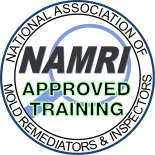 Get
Mold Certified Today
Get
Mold Certified Today ![]() My Account
My Account![]() 800-679-4381
800-679-4381![]() Enroll
Enroll
PROFESSIONAL MOLD INSPECTION INSTITUTE
Mold Inspector / Mold Remediator Training and Certification
 Regulations | FAQs | Tour
| Account
Regulations | FAQs | Tour
| Account![]() 800-679-4381
800-679-4381  Enroll
Enroll
Frequently Asked Questions
Mold Inspection and Remediation Topics:
- What Qualifications do Mold Inspectors and Mold Remediators Need?
- What are the Career Opportunities for Mold Inspection and Mold Remediation?
- How do Mold Inspection and Mold Remediation Services Differ?
- Why Should I join a Non-profit Mold Association?
- How Long Does the Mold Inspection and Mold Remediation Courses Take?
- Can I Use Professional Mold Inspection Institute Logos to Promote my Business?
- What Kind of Equipment Do I Need to Purchase for Mold Inspections?
- How Do I Select a Laboratory for Mold Sample Analysis?
- How Do You Compare to Other Mold Training Providers?
- How Does a Mold Inspection Integrate with a Home Inspection?
- What is the Shipping Method and Return Policy?
- What is Your Privacy Policy?
What Qualifications do Mold Inspectors and Mold Remediators Need?
PMII's mold training courses will help you become a qualified mold inspector or mold remediator in most states except where noted below. Although a mold license is not required in most states, lenders and insurance adjusters want to know that a mold professional is trained, certified and follows national standards of practice. Some states are considering regulations or have legislation pending for mold assessment and mold remediation. For this reason it is important to start now and get "grandfathered in" before new laws are passed. Contact us for more information about particular state requirements.
What are the Career Opportunities for Mold Inspection and Mold Remediation?
Mold inspections have become one of the fastest growing niches in the real estate industry. Mold has been called
the "new asbestos" because it can lead to so many health problems. One academic report published by the
Cadmus Group, sets the annual cost to treat mold-related illnesses at over $20 billion. A mold inspection service
can become a highly-profitable new business, or can make an existing business more successful. With many states
drafting mold legislation, the mold inspection industry will only continue to expand as public awareness grows.
Mold remediation is a significant part of the nation's $200 billion home restoration industry. Home deterioration,
construction defects and acts of nature contribute to this growing market sector. For example, the average cost
to repair a flooded basement is $7,000, but if mold has set in and spread to other areas, that cost can easily
double or triple. There is enormous profit potential in mold remediation, indoor air quality and water damage.
Mold remediators help homeowners find permanent solutions to water damage, mold growth and indoor air quality problems.
How do Mold Inspection and Mold Remediation Services Differ?
Mold inspection is a visual examination of a property for the presence and location(s) of suspected microbial
growth either due to a water event, environmental conditions, material deterioration or construction defects. Samples
collected from the air and surfaces are sent to a laboratory for analysis and the results are included in a written
report for the client. The results of a mold inspection may lead to the need for mold remediation.
Mold Remediation is defined as the removal, cleaning, sanitizing, demolition, or other treatment, including preventive
activities, of mold or mold-contaminated matter. Mold remediation also includes identification and correction of
the source that caused the mold and restoring building materials that were removed. Mold remediation follows a
scope of work that is presented to the client by way of a mold remediation report proposal with a break-down of
costs. The proposal describes the steps needed to correct the source, what is needed to isolate the work areas
and remove the mold, clean and remediate building contents affected by the mold, restore the structure and finishes
to normal condition and pass a mold clearance test.
Why Should I join a Non-profit Mold Association?
There are several mold organizations to choose from, but some are operated by mold labs or mold training schools
who profit from them. Operating for-profit creates a conflict of interest for any national association whose purpose
is to protect and educate the public. PMII graduates receive a $149 paid membership in the National Association
of Mold Remediators and Inspectors (NAMRI), which is a non-profit organization.
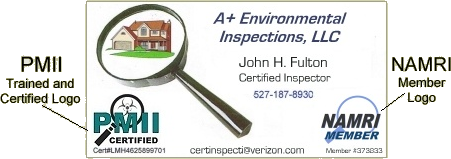
How Long Does the Mold Inspection and Mold Remediation Courses Take?
The 24-hour mold inspection course is self-paced and can be completed in as little as 1-2 weeks or you can take as long as you would like. The 24-hour mold remediation certification course can be completed in about 1 week. You can take the courses 100 % online from any computer or mobile device. Quiz results save automatically to the cloud, so you can check your progress from any computer. Upon passing the final exams, you will receive a certificate you can print out.
Can I Use Professional Mold Inspection Institute Logos to Promote my business?
Yes, print-quality PMII certification logos are available for graduates to promote their business and credentials. PMII Graduates receive lifetime student support to help establish and maintain a successful mold inspection or mold remediation business.
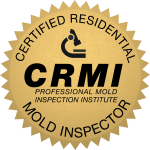
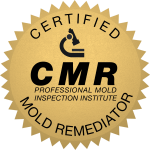
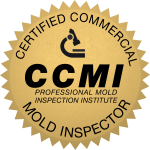
What Kind of Equipment Do I Need to Purchase for Mold Inspections?
For personal protective equipment (PPE), at minimum an N-95 respirator and protective clothing are needed for hazardous locations. Additional equipment depends on the location of suspected mold contamination in the building. Surface samples are collected using plastic tape or swabs, while air sampling requires a calibrated vacuum pump and collection cartridges. Most mold inspectors carry air sampling and surface sampling equipment in addition to moisture meters, humidity meters, and infrared thermometers. We offer our popular air and surface sampling kit at a discount for PMII students.
How Do I Select a Laboratory for Mold Sample Analysis?
There are many choices in laboratories, but you should use an accredited lab that is recognized by the American Industrial Hygiene Association. You should also look at cost, convenience, and turn-around time. Most Mold Inspectors pass lab costs on to the customer, so you should make an effort to give your client the best value. As a Certified Mold Inspector it would be a conflict of interest to perform a mold analysis yourself even, if you are a qualified industrial hygienist, or to have any influence on the results of your professionally collected samples.
How Do You Compare to Other Mold Training Providers?
Cost Comparison:
PMII's training cost is the most reasonable in the mold training industry. Mold seminars typically start at around
$1,000 for a 2-day seminar, not counting travel expenses which can double the price. Distance mold courses typically
cost less than mold seminars due to lower overhead. Some mold courses can come with additional hidden costs such
as annual fees. PMII offers the best enrollment prices for an accredited school and provides everything you need
to learn from home. There are no recurring or hidden fees.
Content Comparison:
Many mold courses and seminars are less than 24 hours long. Many are provided by mold labs or venders, not actual
schools, and are trying to promote their sampling products. PMII teaches you practical information in addition
to theory. PMII's course material is aligned with national standards of practice for the mold industry and is updated
regularly. We teach you the key information that you must inspect for and include in your final report. Every lesson
is concise and written in clear language that is easy to understand. We list the precise learning objectives for
each lesson and teach you how to systematically perform each part of a mold inspection, including how to prepare
your final report. PMII's training was designed in-house by experienced mold inspectors who understand the trade.
Interactivity Comparison:
PMII offers online interactive mold training programs. Some competitors provide document downloads, but without
interactivity that lets you know how much you are learning. PMII's course design allows you to interact with the
material. Interactive features include flash cards that ask you questions and test what you have learned. The online
quizzes provide feedback so you can identify what you still need to learn. The video demonstrations, numerous color
illustrations, and videos provide the foundation for each new concept. We encourage you to do your research before
enrolling in any mold course. Avoid mold inspection courses not offered by licensed training providers, where course
tuition is not refundable. Verify the company's school location, credentials, and refund policy before you enroll.
How Does a Mold
Inspection Integrate with a Home Inspection?
PMII mold inspection training follows the standards of the National Association of Mold Inspectors and Remediators
(NAMRI), which treats the process of a mold inspection similar to a home inspection. Many parts of a common home
inspection overlap with a mold inspection, including Grounds, Exterior Structure, Plumbing, Interior and HVAC.
This allows a mold inspection to be conducted at the same time as a home inspection which saves time and money
for both the home inspector and the client.
Policies
How do you ship course materials and tool kits?
Course materials and tool kits are shipped via UPS Ground, Fedex Ground and USPS, and typically take 5-7 business days for delivery. We ship to the U.S. and Canada. Customs fees (import duties), if applicable, are the customer's responsibility.
What is the return policy?
Materials must be returned in as-new condition within 30 days of receipt. You must contact us first to obtain a return number. Returns with damaged or used items will be prorated. Refunds are credited within 7 business days of receipt of the return. Shipping and handling is not refundable.
Purchased Content Agreement
PMII grants you, the Customer, a non-exclusive, non-transferable, lifetime license to use and access certain
content hosted by PMII and granted to Authorized Users. Lifetime access is defined as so long as PMII is providing
support and access to the Purchased Content. Should PMII decide to terminate providing the content, PMII will provide
reasonable notice to the Customers and could make the content available through other means.
PMII providing lifetime access is at will and at no time is the customer offered or provided a refund should PMII
decide to terminate the content. The Purchased Content may be removed, altered, modified, or revoked at any time
without notice from PMII, if such Purchased Content contains errors (as determined in PMII???s discretion), or
is subject to an infringement or third party claim.
Access to the Purchased Content via the PMII website may be affected by, but not limited to, internet service provider
issues, outages of the hosting platform, or other issues outside of our control. PMII shall not be responsible
for any damages, costs, expenses, fees, or liabilities incurred for failure to access the Purchased Content.
The original purchaser shall be the only Authorized User. In no event shall any person or entity be entitled to
reproduce, duplicate, copy, sell, or by any other means exploit the Purchased Content for any purpose that is not
expressly consented to by PMII. Posting or sharing passwords or enabling access by non-purchasing users without
obtaining or purchasing additional accounts is strictly prohibited. Upon breach of this agreement, the Customer's
access to Purchased Content shall cease immediately. All costs of enforcement, including actual attorneys??? fees
and court costs shall be reimbursed by the violating entity.
PMII???S ENTIRE LIABILITY ARISING FROM THIS AGREEMENT, WHETHER IN CONTRACT OR TORT, WILL NOT EXCEED THE THEN EXISTING
PRICE OF THE PURCHASED CONTENT. PMII SHALL NOT BE LIABLE FOR ANY INDIRECT, SPECIAL, PUNITIVE OR CONSEQUENTIAL DAMAGES
(INCLUDING, WITHOUT LIMITATION, LOST PROFITS) ARISING OUT OF THIS AGREEMENT. Nothing in this agreement excludes
or limits our liability for any matter for which it would be illegal for us to exclude or attempt to exclude our
liability.
User Obligations. As a precondition to use PMII???s Purchased Content, the Customer warrants and guarantees that
such user will abide by, without limitation, all applicable local, state, national and international laws and regulations
with respect to your use of the Purchased Content and not interfere with the use of the website by other users
or interfere with PMII???s operation and management of the website.
This agreement and any dispute or claim arising out of or in connection with your purchase (including non-contractual
disputes or claims) will be governed by South Dakota law, without respect to its conflict of laws provisions and
will be subject to the non-exclusive jurisdiction of the courts located in the state of South Dakota. You expressly
agree to submit to the exclusive personal jurisdiction of the state and federal courts sitting in the State of
South Dakota.
What is Your Privacy Policy?
Information Collection, Use, and Sharing:
We are the sole owners of the information collected on this site. We only have access to/collect information that
you voluntarily give us via email or other direct contact from you. We will not sell or rent this information to
anyone. We will use your information to respond to you, regarding the reason you contacted us. We will not share
your information with any third party outside of our organization, other than as necessary to fulfill your request,
e.g. to ship an order. Unless you ask us not to, we may contact you via email in the future to tell you about specials,
new products or services, or changes to this privacy policy.
Your Access to and Control Over Information:
You may opt out of any future contacts from us at any time. You can do the following at any time by contacting
us via the email address or phone number given on our website: (1) See what data we have about you, if any; (2)
Change/correct any data we have about you; (3)Have us delete any data we have about you; (4) Express any concern
you have about our use of your data.
Security:
We take precautions to protect your information. When you submit sensitive information via the website, your information
is protected both online and offline. Wherever we collect sensitive information (such as credit card data), that
information is encrypted and transmitted to us in a secure way. You can verify this by looking for a closed lock
icon at the bottom of your web browser, or looking for "https" at the beginning of the address of the
web page.
While we use encryption to protect sensitive information transmitted online, we also protect your information offline.
Only employees who need the information to perform a specific job (for example, billing or customer service) are
granted access to personally identifiable information. The computers/servers in which we store personally identifiable
information are kept in a secure environment. If you feel that we are not abiding by this privacy policy, you should
contact us immediately via our contact page.
![]()
30-Day Money-Back Guarantee
![]()
The only mold inspection and mold remediation training with a satisfaction guarantee!

©Professional Mold
Inspection Institute (PMII). All rights reserved.


